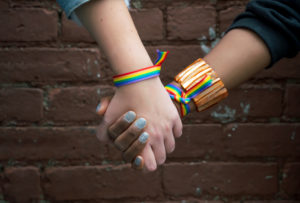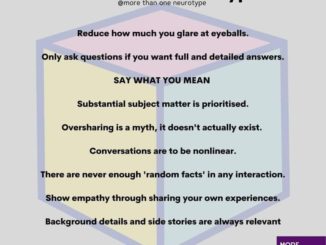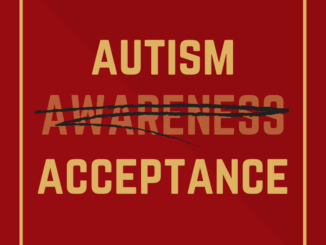
Continuing discussion of Autistic intersectionality…
In studies examining the relationship between two things, it’s important to understand the directionality of the relationship. Just because all A are B, doesn’t mean that all B are A.
That being said, there *is* actually a correlation in both directions when it comes to autism and gender diversity: people who are gender non-conforming, or gender-diverse, are much more likely to be autistic. People who are autistic are much more likely to be gender diverse or gender non-conforming.
If you take a group of autistic adults and have them complete a measure of gender identity and self-expression, they will vary much more widely from the accepted “norms” than a group of allistic adults.
If you take a group of trans and gender-nonconforming people and have them complete screeners about sensory sensitivity and measures of autistic traits, they will score much more highly than cisgender people.
You might be able to guess after yesterday’s post that this gets orders of magnitude more complicated for autistic people who are not assigned male at birth or are not raised to be male — and therefore whose autistic traits are misdiagnosed, misunderstood, or missed entirely, because of autism still often being viewed as a “boys’ diagnosis”.
If you’ve followed along with me thus far without disagreeing on issues like “autistic people should be allowed to stim”, “autistic people should be allowed to get super involved in their own special interests”, “we as a society don’t need to compound the trauma of autistic people by requiring them to look non-autistic for no good reason”, and, perhaps the underlying theme of all of it, “social constructs can be changed”, then you may be one step ahead of me already when I say: there is no reason that autistic people (or, you know, anybody else at all) shouldn’t be allowed to express their gender however they want to.
And also…does it surprise anybody at all that people who are told that they don’t fit the expected mold from day one also grow up and are more likely to question other arbitrary societal constructs? 😊
Overlap Between Autism & Gender Identity
Autistic Traits in Gender-Diverse Individuals
Gender Identity Differences in Autistic Adults
Rates of Autism in Studies of Gender Diverse Individuals



